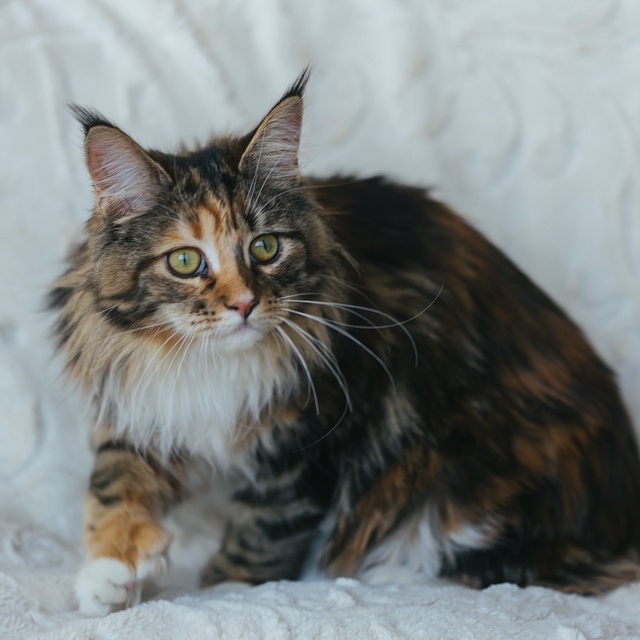Maine Coon cats are a beloved breed known for their unique personality traits. However, they can be susceptible to various health issues. In this article, we’ll dive deeper into the common diseases, disorders, and sicknesses that Maine Coon cats may face, as well as the costs associated with treatment. We’ll also discuss some common medications to keep around your home from the vet to help your Maine Coon.
The Most Common Health Issues in Maine Coon Cats
Maine Coon cats are generally a healthy breed, but they can still experience health issues. Here are the most common health issues that Maine Coon cats may face:
Hip Dysplasia
Hip dysplasia is a condition where the hip joint doesn’t fit together correctly, which can lead to pain, inflammation, and eventually arthritis. Maine Coon cats are prone to hip dysplasia due to their large size. Symptoms include limping, difficulty climbing stairs, and decreased activity levels.
Steps to Help Your Maine Coon:
- Keep your Maine Coon at a healthy weight to reduce stress on their joints.
- Provide a comfortable, supportive bed.
- Consider providing joint supplements or medication prescribed by a veterinarian.
- Consult with a veterinarian about surgery options, if necessary.
Hypertrophic Cardiomyopathy
Hypertrophic cardiomyopathy is a condition where the heart muscles become thick, making it difficult for the heart to pump blood effectively. Maine Coon cats are prone to hypertrophic cardiomyopathy due to a genetic predisposition. Symptoms include coughing, labored breathing, and lethargy.
Steps to Help Your Maine Coon:
- Schedule regular check-ups with a veterinarian to monitor heart health.
- Provide a healthy diet and regular exercise.
- Consult with a veterinarian about medication options.
- Consider implanting a pacemaker or defibrillator in severe cases.
Polycystic Kidney Disease
Polycystic kidney disease is a genetic condition where cysts form on the kidneys, leading to kidney failure. Maine Coon cats are prone to polycystic kidney disease, with an estimated 30-40% of the breed affected. Symptoms include increased thirst, decreased appetite, and lethargy.
Steps to Help Your Maine Coon:
- Schedule regular check-ups with a veterinarian to monitor kidney health.
- Provide a healthy diet and plenty of fresh water.
- Consider medication options to manage symptoms.
- In severe cases, consider kidney transplant or dialysis.
Spinal Muscular Atrophy
Spinal muscular atrophy is a genetic condition that affects the spinal cord, leading to muscle weakness and atrophy. Maine Coon cats are prone to spinal muscular atrophy, with an estimated 5-10% of the breed affected. Symptoms include difficulty walking, muscle weakness, and tremors.
Steps to Help Your Maine Coon:
- Consult with a veterinarian about medication options.
- Provide a supportive bed and easy access to food and water.
- Consider physical therapy to improve muscle strength.
- In severe cases, consider a wheelchair or cart to help your Maine Coon move around.
Other Health Issues in Maine Coon Cats
While less common, Maine Coon cats can also experience other health issues, including:
- Feline Lower Urinary Tract Disease (FLUTD)
- Diabetes
- Asthma
- Ear Infections
- Dental Problems
Steps to Help Your Maine Coon:
- Schedule regular check-ups with a veterinarian to monitor overall health.
- Provide a healthy diet and plenty of fresh water.
- Keep your Maine Coon at a healthy weight.
- Consult with a veterinarian
Costs Associated with Treating Maine Coon Cat Health Issues
Treating any of the above-mentioned health issues in Maine Coon cats can be expensive, and the costs can vary depending on the severity of the condition and the location. For example, hip dysplasia surgery can cost anywhere from $1,000 to $5,000, while treatment for polycystic kidney disease can cost upwards of $7,000.
It’s important to understand that early detection and treatment can help reduce the costs associated with these health issues. Additionally, many veterinary clinics offer payment plans and pet insurance can also help mitigate the costs.
Common Medications to Keep Around Your Home for Your Maine Coon
While consulting with a veterinarian is always recommended, it’s also useful to have some basic medications on hand for your Maine Coon. Here are some common medications that can help alleviate some health issues in Maine Coon cats:
Flea and Tick Prevention Medication
Flea and tick prevention medication is essential to keep your Maine Coon cat healthy and free from fleas and ticks. There are several options available, including topical treatments, oral medications, and flea collars.
Wound Care Medication
Cats can be prone to injuries, and having a wound care medication on hand can help treat minor cuts and scrapes. Products like Betadine and Neosporin can help disinfect and promote healing.
Antihistamines
Maine Coon cats can experience allergies, which can cause sneezing, itching, and respiratory problems. Antihistamines like Benadryl can help alleviate these symptoms.
Laxatives and Hairball Remedies
Maine Coon cats are prone to hairballs, which can cause digestive issues. Laxatives and hairball remedies can help prevent hairballs and alleviate digestive issues.
Rarity and Prevalence
It’s important to note that while some health issues are more common in Maine Coon cats than others, the rarity of certain health issues can also play a significant role. For example, spinal muscular atrophy and polycystic kidney disease are rare but have a higher prevalence in the Maine Coon breed.
Conclusion
In conclusion, Maine Coon cats can experience various health issues, but early detection and treatment can help mitigate the severity and cost of these issues. Be sure to schedule regular check-ups with a veterinarian, provide a healthy diet and plenty of fresh water, and keep your Maine Coon at a healthy weight. Additionally, having some basic medications on hand can help alleviate some health issues in Maine Coon cats. Remember to consult with a veterinarian before administering any medication to your feline friend.
